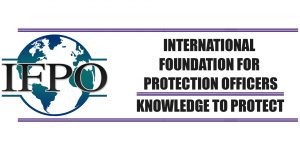WHAT: IFPO Global Webinar #4: Dealing with Violence, led by Dr. Glen Kitteringham.
WHEN: Apr 21, 2021 08:00 AM in mountain time (US and Canada)
WHY: Because having a successful security career is about continuing education, and this webinar is free.
HOW: Register in advance for this webinar: https://us02web.zoom.us/webinar/register/WN_l7sE7CFOTbyzwmDPJuylfQ
* After registering, you will receive a confirmation email containing information about joining the webinar.
The job of the security officer is an inherently dangerous one. Guards regularly experience high levels of verbal abuse and physical violence, which is to be expected, given that rule enforcement is a key component. Verbal abuse includes low level "push back," personal attacks, profanities and threats of employment termination and direct threats against guards' lives.
The violence guards experience includes threats or punches, kicks, spitting and being bitten and also the use of various weapons, including improvised, guns, knives and explosives. Low-level violence includes bruises, whereas high-level violence results in death. This violence comes from a variety of groups, including hospital patients, street people, client guests and hardened criminals. There is an inconsistency in the self-defence and conflict de-escalation training provided despite the high-risk environment guards work within.
GET CERTIFIED! Elevate your security career with an IFPO certification!
This study examines the nature of violence experienced by licensed security guards in Alberta, Canada and how they manage that violence. Twenty security guards participated in semi-structured interviews and shared their personal experiences. In addition, a variety of information was analysed from sources, including workers compensation board statistics, occupational health and safety investigations, media reports and data provided by a contract guard provider.
Topics of discuss today will include:
-- Research findings from work undertaken in 2018 and 2019 on how security officers manage workplace violence
-- Predictors of violence
-- Tactics to manage violence
-- Situational awareness
___________________________________________________________________________________________________________________


